Horse Farm with Equestrian Trail Protected
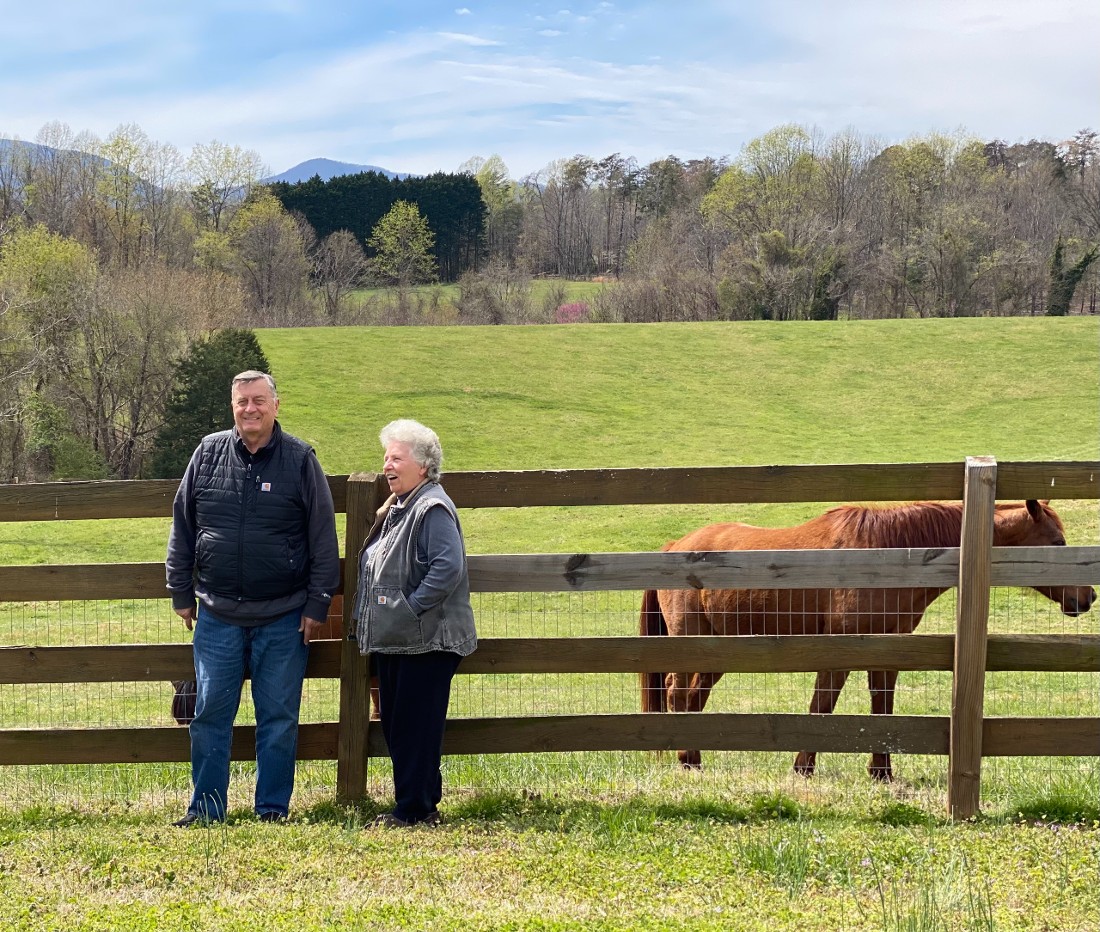
When Ben and Rhonda King were choosing where to live in retirement, she says, their main criteria came down to one thing: “Horses.” The place they eventually found, near Tryon, offered not only a scenic spot for their own home, but a historic community as devoted to horses as they were. Their farm in the part of Polk County known as Hunting Country is part of a unique trail network that gives them access to over 125 miles of equestrian trails—and expands that access to others who love horses.
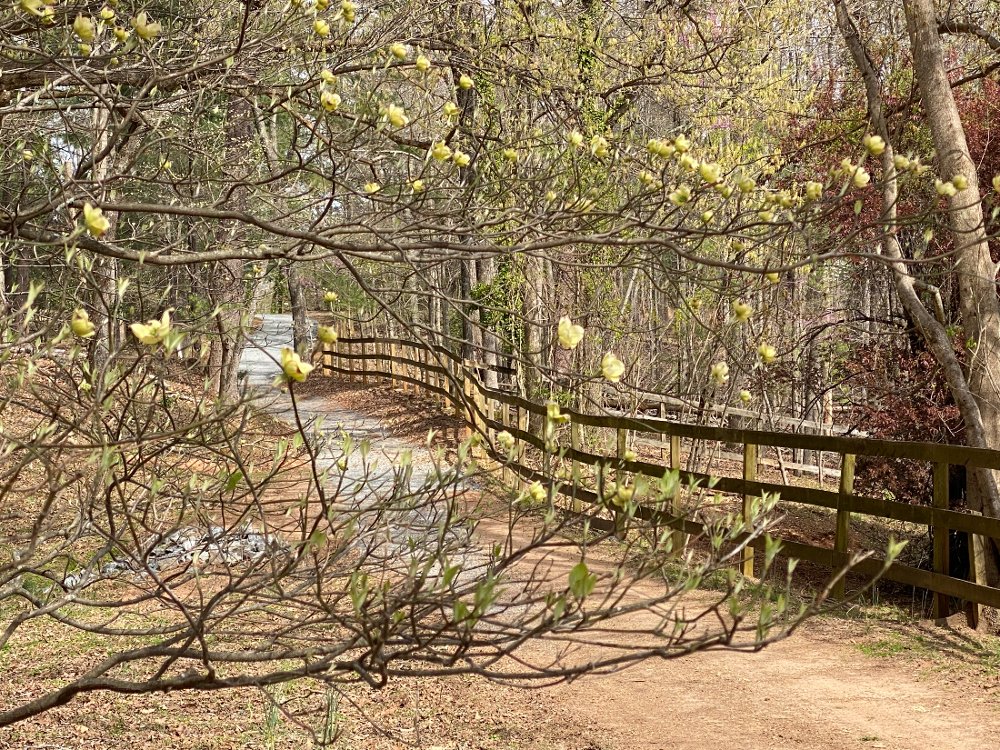
Rhonda first bonded with horses as a girl, growing up in Paducah, Kentucky. She remembers riding a big plow horse when she was so small that her legs splayed almost horizontally across its back. Still, horses didn’t play a big role in her adult life. Ben’s work in hospital management moved their family around the Southeast and they often made their home in cities or suburbs. They enjoyed living in Tampa, Daytona Beach, St. Simons Island in Georgia, then Dallas.
While they were raising their two sons, Rhonda stayed too busy for horses. She says, “With two boys, you were always in something – Scouts, church, choir. I didn’t really have time for horses until they graduated.”
After their sons finished high school, the Kings moved outside of Dallas where they had a little more land and they got some horses. Ben grew up in Greenville, SC—far from Rhonda’s roots in Kentucky’s horse country—but they both shared a love of horses. Rhonda started training for endurance races. Her first goal was to build herself and her horse up to 25-mile races, in a sport where the longest events are epic 100-mile contests that can go for twelve hours or more (with vet checks to ensure the horse isn’t being overworked.)
Then their life took a turn.
Rhonda says, “He comes home and says, ‘I think I want to retire. Let’s think about where we want to go.’” It turned out that Ben had the chance to retire earlier than planned. So, they started looking for a new home.
They knew that they wanted a horse farm. And they wanted to live in a horse-friendly community, where they could find services like veterinarians and farriers. That led them to Hunting Country—a rural area with its own distinctive character. “It has a different flavor from anything else,” Rhonda says.
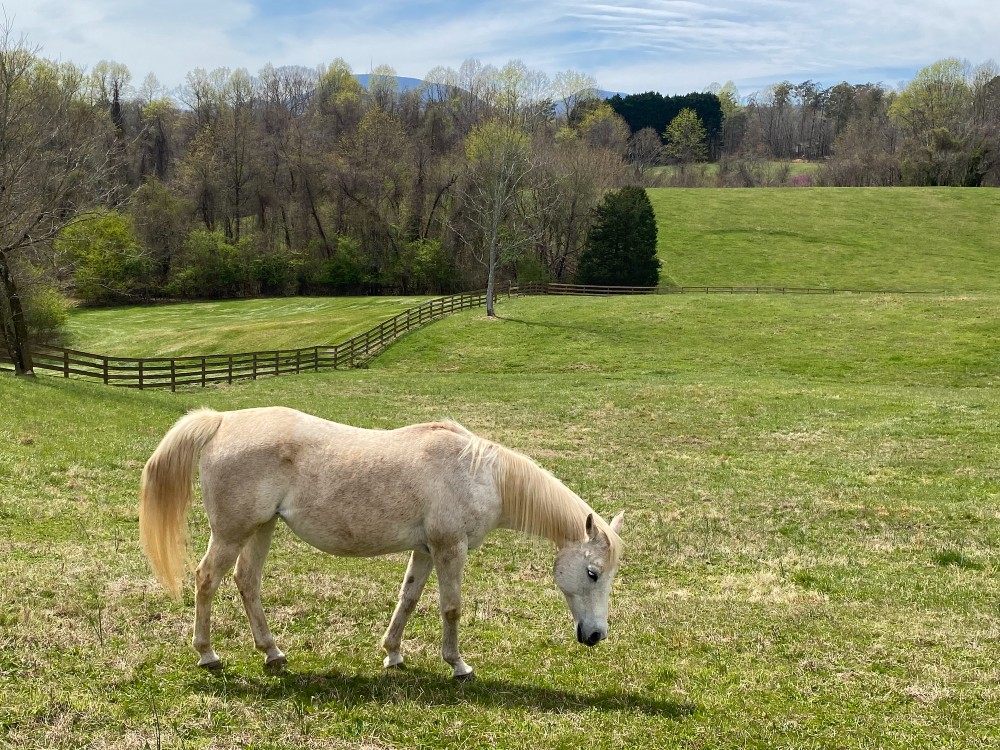
As you approach their home on Hunting Country Road, you start seeing more wooden fences along rolling pastures, more barns among the hills, and more horses grazing in the fields. On a sunny day in March, the fields were bright with spring grass, while the woods were still leafless. Redbuds were blooming and the first dogwood buds had opened. The bare trees and open fields offered views of mountains on the horizon, past rolling hills.
This community has been defined by horses since the 1800s, when wealthy South Carolinians who wanted to get away from the heat of the Low Country began establishing second homes there, bringing with them a love of horses and horse racing. Over the next two centuries, the community drew equestrians from all over the country.
The property where the Kings now live was once part of the vast open expanses used for fox hunting. In the 1950’s, it became a pony farm, with an oval track that ringed the property. Later, the land was owned by George and Betty Stinson, after George retired as CEO of the National Steel Corporation. The Kings bought the land in 2004 and renovated the home that the Stinsons had built. To honor the history of the land, they call their place Pony Track Farm.
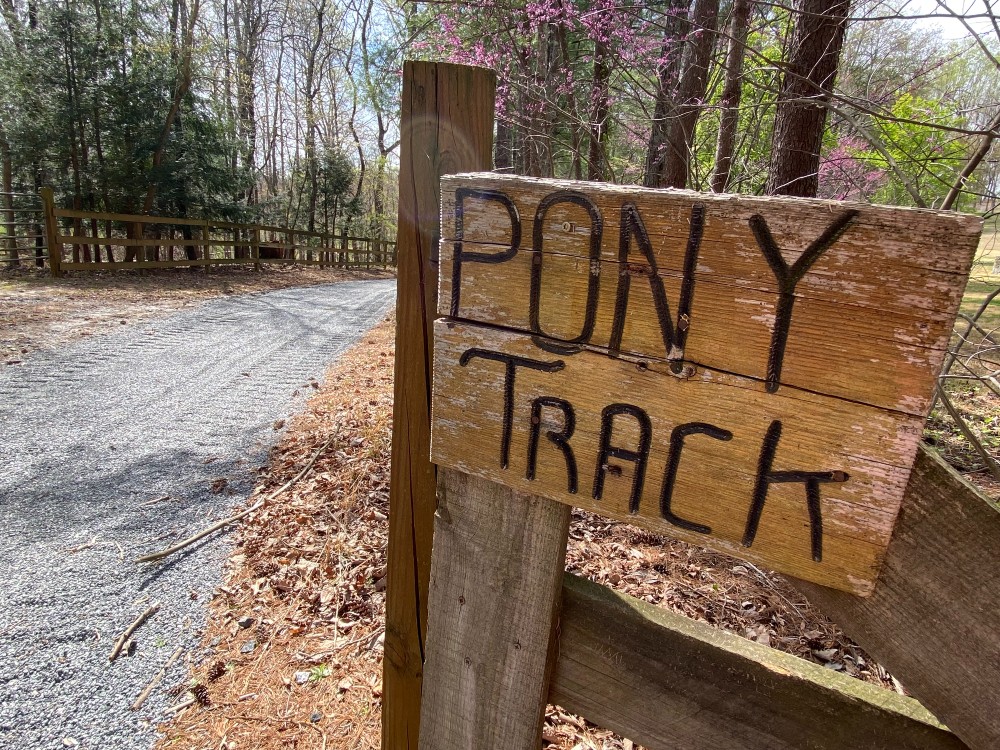
They graze three Polish Arabian horses on their nearly 80-acre farm—but they can ride across a much wider swath of countryside, thanks to the Foothills Equestrian Trails Association (FETA) trail network. This network crosses the King’s land, following the historic pony track. In all, there are more than 125 miles of equestrian trails spanning 15 square miles of countryside around Tryon, Campobello, and Landrum—used for horseback riding and occasionally horse-drawn carriages.
Unlike some equestrian trail systems, FETA isn’t an exclusive club and it’s not limited to landowners. Anyone in the local community can become a member if they pay the annual membership fee and follow the trail rules. Membership is open to people who live, board a horse, or own property in Polk County or the Campobello or Landrum area. The membership dues are used to maintain the trails and provide insurance for the landowners who are granting trail access through their property.
The people who enjoy this pastoral landscape treasure its unique charms and hope to preserve them—for example by securing trail easements along the longstanding trail network that is now maintained by FETA. Many nearby landowners have also placed their land under conservation easement. In fact, there are 42 protected properties within a 2.5-mile radius of Pony Track Farm.
The Kings wanted to do their part to protect this place that they love for its serene and historic character. So, this year they generously donated a conservation easement on nearly 66 acres to Conserving Carolina. This means that the land remains their private property, but it can never be developed. Ben says, “In my mind, it’s about protecting the legacy of this property and maintaining its nature.”
He says that they see an abundance of wildlife on the farm, including deer, turkey, coyotes, and foxes. A survey of the property found numerous species including hawks, songbirds, salamanders, turtles, mammals, and fish. The survey found potential for six kinds of rare animals and seven kinds of rare plants. It also found Cherokee sedge growing on the land—a native plant that is endangered in North Carolina.
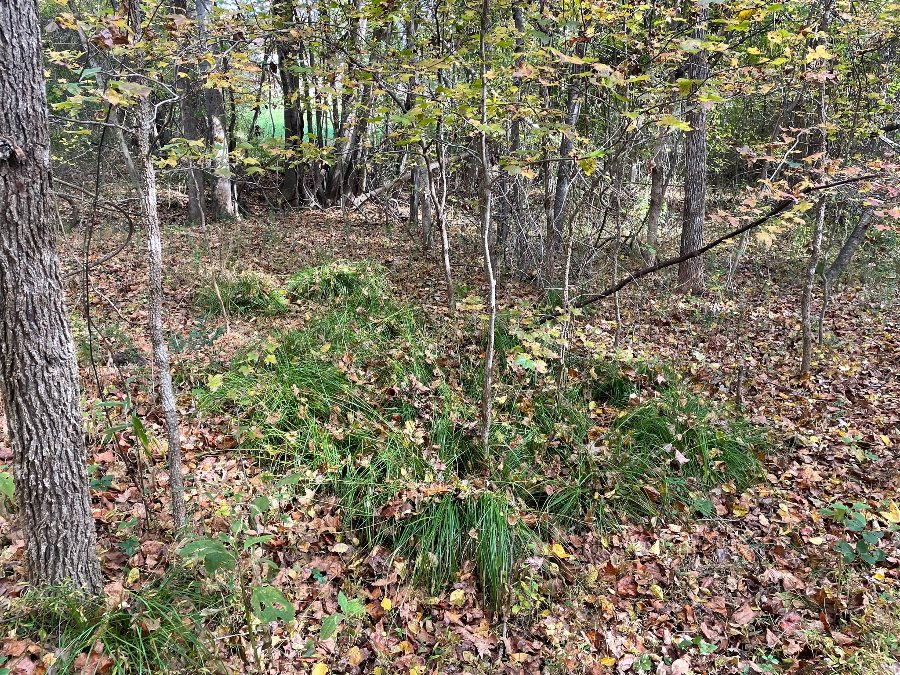
This now-protected property provides a mix of habitat to support these diverse species, including open fields, four types of forests, over a mile of streams, several seeps, and headwater wetlands. The conservation easement also keeps this fertile land available for agriculture. Nearly 90% of the conserved land is comprised of prime farmland or important farm soils.
Tom Fanslow, Conserving Carolina’s Land Protection Director, says, “The Kings understand that Polk County’s horse country is pretty special and must not be taken for granted or developers will name subdivisions after the horse farms they replaced. The Kings followed the example of other owners in their community and have set a new precedent. For the first time I know of in Polk County, the Kings gave Conserving Carolina the right to ensure a rare plant can continue to flourish on their farm. I know the Kings join me in asking all horse farm owners to consider preserving a way of life that grows rarer by the day.”
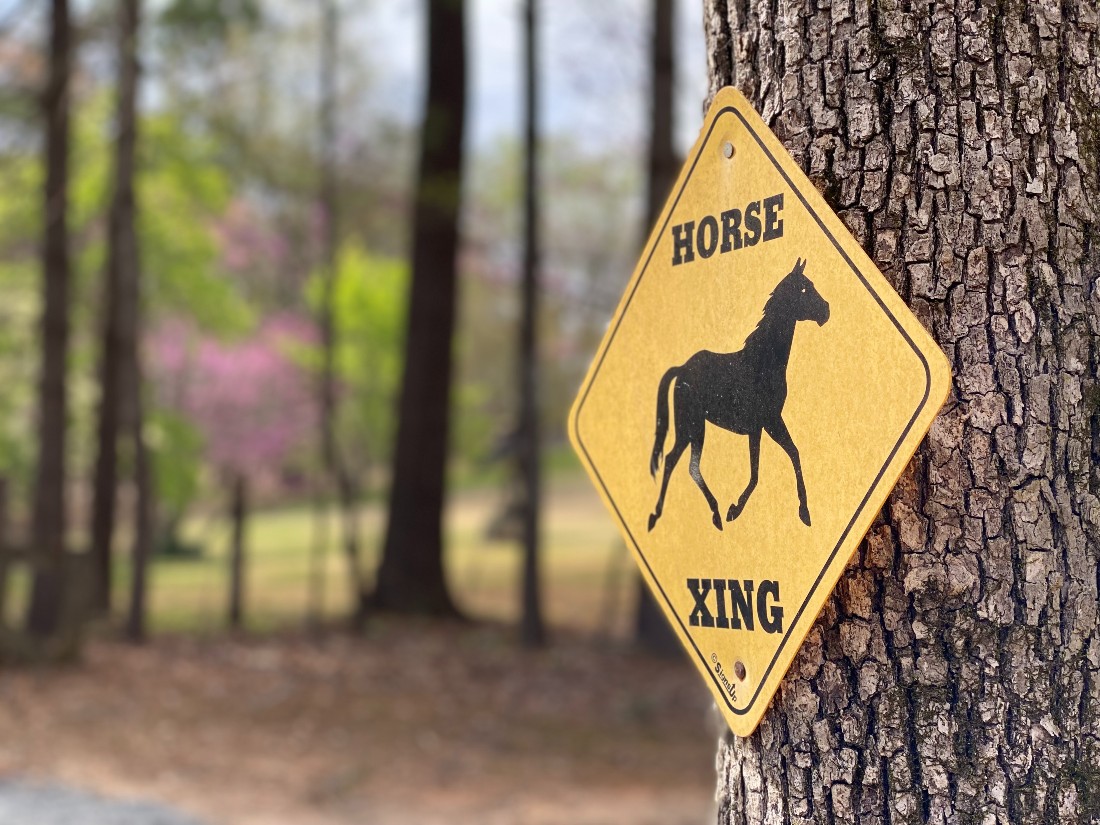
Kathy Nebel, the president of FETA, says, “Land conservation and horses go hand in hand. Riders need open space for trails, land preserved for agriculture to grow hay, and tracts of land for horse farms. Conserving open space to attract horse owners is beneficial to the local economy. We support veterinarians, farriers, hay producers, saddle fitters, tack shops, feed stores, trainers, body work practitioners, and farm equipment dealers. Local residents enjoy the landscape resulting from open space for farms.”
She continues, “We have a long history of horses in Polk County which we strive to preserve. Pony Track on the Kings’ property has been used by horses for decades. Conserving it and other horse trails is an important component in ensuring the next generation can enjoy horses in Polk County.”